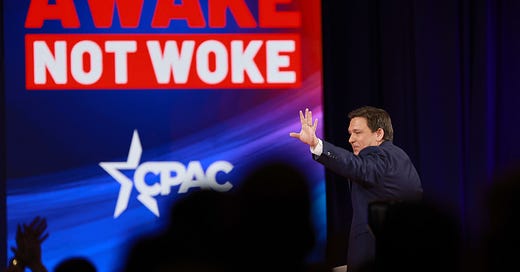Democrats Have Become Too Reliant on Corporations to Push Progressive Values
The road to governing Florida does not run through The Walt Disney Company
Dear readers,
Who do liberals have the power to convince these days, and who do they focus on convincing?
I ask this question because it’s strange that so much of the activist response to the so-called “Don’t Say Gay” law recently signed by Florida Gov. Ron DeSantis has been focused on The Walt Disney Company. The law, widely backed by Republican politicians in the state, restricts K-12 instruction related to sexual orientation and gender identity and imposes a number of other ambiguous requirements that opponents reasonably feel could intimidate some teachers out of the mere mention of LGBT people — especially since those requirements are backed by a private right of action.
Disney’s offense is that it did not do enough early enough to communicate its opposition to the bill, and that it donated money to Florida Republicans who devised the law. Disney is an attractive target for activism because, unlike Florida Republican politicians, it has to care what liberals think. And the activists got Disney to move: The company issued a statement criticizing the law. It announced it will “pause” political giving in Florida. It has restored a same-sex kiss that had been cut from a future Pixar release. Meanwhile, Florida Democrats fought over a planned fundraiser at Walt Disney World, which the state party quickly announced it would relocate and reschedule in light of the discontent with the company.
Those are deliverables that you might value — especially if you’re objecting to the Florida law from outside Florida. But if your goal is to set the public policy of Florida, isn’t that all a little bit oblique? The idea of Disney as the tail that wags the dog of Florida politics used to be a talking point about undue corporate influence in a democratic system; now, it’s supposed to be a political tactic to wield for progressivism.
And as we’re seeing, fighting this fight through Disney is not going to work — or at least, it didn’t work to block the law. It reflects a problem with liberal advocacy today: advocates are used to addressing blue-state institutions (like Burbank-based Disney) whose leaders already buy into the precepts of social liberalism; they make arguments aimed at those institutions rather than the electorates of specific states; and they defend the interests of blue-state residents who have a greater stake in what Disney does than in what Florida’s government does.
It’s true that over the past few years, liberals have had some success pressuring corporations to pressure Republicans in state governments against pursuing conservative culture-war wedge politics. Corporate outrage led Indiana to gut a law that would have undermined non-discrimination protections for LGBT people, and was one factor that drove (after years of wrangling) the expiration of HB2, a North Carolina law that prohibited local anti-discrimination ordinances and banned transgender people from the bathrooms in government buildings that match their gender identities.
But it’s important to note a few ways that the Florida situation is different. Conservatives are no longer caught off guard by these tactics. They have adopted a more hostile rhetorical position toward the corporate sector, and are more inclined to pursue these fights in the face of corporate opposition. Corporate opposition has not given pause to Georgia Republicans imposing new voting restrictions or Texas Republicans seeking to restrict access to abortion or certain treatments for transgender minors. Regarding Disney’s opposition to this law, DeSantis declared, “I don't care what Hollywood says. I don't care what big corporations say.” To the extent using the increased social liberalism of the corporate sector as a political lever amounted to One Weird Trick for liberals, that Trick is losing its power.
Another difference is that we’re not talking about the siting decision for a convention or an all-star game. Walt Disney World is the world’s largest theme park complex, and it’s not going anywhere. Disney can “pause” political giving until the heat dies down, but it can’t credibly threaten to leave Florida (and won’t try to), and that limits its leverage over politicians in the state. Ultimately, so long as Republicans win elections in Florida, Disney will find ways to work with them.1
A final difference is one liberals especially need to think hard about: unlike some of the other proposals that liberals have found ways to throw corporate power at, it’s not at all clear that the new Florida law is unpopular. Non-discrimination laws poll well and “bathroom bill” proposals have tended to poll poorly — a fact I’ll get back to in a moment; it’s not the case that trans issues are inherently a political liability for Democrats — but polling in Florida suggests this current proposal has significant public support, at least as voters understand it today.
What would it take to actually control the government of the state of Florida? Well, getting there is a much less pleasant process — one that would require stakeholders in liberal politics to have some arguments with each other instead of just agreeing about how terrible the other side is. And that’s another reason it’s more attractive to rage at Disney than to make the compromises that would be necessary to win elections and govern in Florida and block the adoption of laws like this.
Keep reading with a 7-day free trial
Subscribe to Very Serious to keep reading this post and get 7 days of free access to the full post archives.



